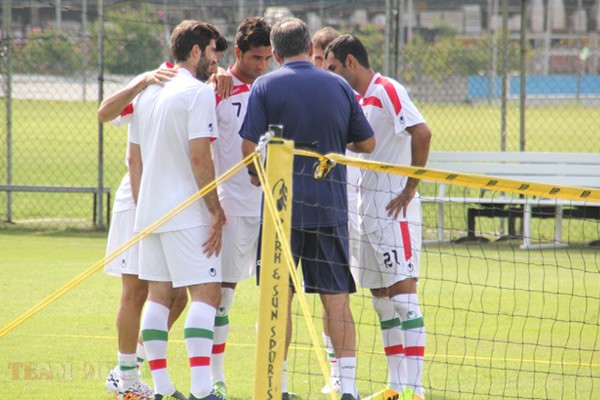
Carlos Queiroz’s side beat Trinidad and Tobago on Friday and his assistant is confident they are ready for the challenge of the summer showpiece Iran assistant coach Oceano Cruz was quick to switch the country’s focus to their World Cup opener with Nigeria after the2-0 win over Trinidad and Tobago on Friday.Carlos Queiroz’s side had been on a four-match winless run before Sunday’s friendly victory in Sao Paulo.And assistant coach Cruz is happy to be heading to Brazil on the back of a victory, but is keen not to dwell on the result and instead urged the squad to concentrate on the Group F clash against Nigeria next Monday.’It was a game that has fulfilled our expectations,’ Cruz told Globo esporte.’We are preparing for the first match against Nigeria. Our only concern is Nigeria at the moment.’Victory is always important to create a culture of winning. This only happens with results like this.’As well as Nigeria, Iran also face Argentina and Bosnia-Herzegovinain Group F.
[divider]
Team Melli continued the training on Monday in preparation for the Nigeria game. After the long coach journey is Sao Paulo\s heavy traffic , coaching staff opted to give the players a break and mainly light training. Ashkan Dejagah , who received a knock in the Trinidad & Tobago’s match was rested and watched his teammate on the sideline. Hashim Beikzadeh , on the other hand, continued regular training with the squad.
The training ground was different from the usual one , Corinthians Club CT, as this one is situated in Guarulhos , 43 km North east of São Paulo, and close to the Sao Paulo international airport. The news of Team Melli being in Guarulhos traveled fast and soon the local football fans flocked to the training ground to watch Team Melli Training. A limited number of them were allowed to enter the stands to watch the practise. The Iran flag waving crowds were thrilled to experience a piece of World Cup in this football mad nation, as reported by the local journalists .
At the end of the practice, Carlos Queiroz invited some of the fans , mainly the children to mingle amongst the players and get their autographs.


[divider]
Argentina

[divider]
Bosnia-Herzegovina



